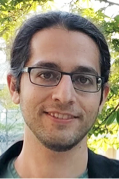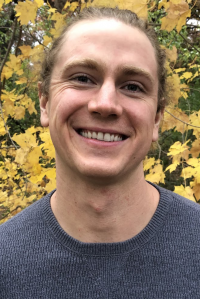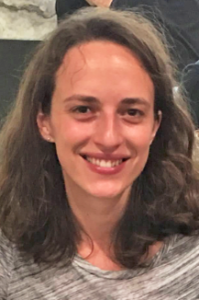September 2021
In celebration of National Postdoc Appreciation Week (September 20-24), we are delighted to introduce Roei Tell, Cameron Thieme, and Nicole Wein as new postdocs at DIMACS. They join continuing postdocs Troy McMahon, Ariel Schvartzman Cohenca, and Ewerton Rocha Vieira, as the entire Rutgers community returns to campus after a year online.
Roei works in computational complexity, the theoretical field that studies the capabilities and limitations of computers and algorithms. He focuses on the role of randomness in efficient computation: We know that randomness is crucial to solve certain problems (e.g., to learn from partial information) but isn’t needed at all to solve certain other problems (e.g., to quickly multiply two numbers). What distinguishes one type of problem from the other? This is one of the main questions in computational complexity, with inherent ties to the other main questions in the area. Roei’s research focuses on pushing forward the state-of-the-art knowledge about this question, as well as on understanding the reasons that make thiis question so central.
that randomness is crucial to solve certain problems (e.g., to learn from partial information) but isn’t needed at all to solve certain other problems (e.g., to quickly multiply two numbers). What distinguishes one type of problem from the other? This is one of the main questions in computational complexity, with inherent ties to the other main questions in the area. Roei’s research focuses on pushing forward the state-of-the-art knowledge about this question, as well as on understanding the reasons that make thiis question so central.
As the 2021-2023 DIMACS/IAS postdoc, Roei will be based at DIMACS for the 2021-22 academic year and at the Institute for Advanced Study (IAS), hosted by Avi Wigderson, next year. Roei completed his Ph.D. in Computer Science at the Weizman Institute of Science in 2020, advised by Oded Goldreich, and he comes to DIMACS from MIT, where he spent a year as a postdoc in Ryan Williams’s research group. Roei’s accolades include the John F. Kennedy Prize for outstanding achievements in his doctoral studies at the Weizmann Institute, the Shimon Even Prize for research in theoretical computer science, a Rothschild Postdoctoral Fellowship, and the Danny Lewin Best Student Paper Award at the ACM Symposium on Theory of Computing (STOC) in 2019.
On a personal note, he says, "I live in NJ with my wife and our overly verbal cat, and am constantly looking for good teas, restaurants, and story-based RPGs. I love to chat, please feel welcome to drop me a line!"
If you want to learn more about Roei’s research, you can attend his upcoming talk in the Rutgers/DIMACS Theory of Computing Seminar (on September 29), or you can explore a few of his recent papers:
Lijie Chen and Roei Tell, Hardness vs Randomness, Revised: Uniform, Non-Black-Box, and Instance-Wise, to appear in Proceedings of the 62nd Annual IEEE Symposium on Foundations of Computer Science (FOCS 2021). [ECCC]
William Hoza, Pooya Hatami, Avishay Tal, and Roei Tell, Fooling Constant-Depth Threshold Circuits, to appear in Proceedings of the 62nd Annual IEEE Symposium on Foundations of Computer Science (FOCS 2021). [ECCC]
Roei Tell, How to Find Water in the Ocean: A Survey on Quantified Derandomization. [ECCC]
Cameron is a postdoc associated with the DATA-INSPIRE TRIPODS Institute led by DIMACS. His research focuses on the use of topological methods in dynamical systems. In particular, he is interested in how classical methods developed for single-valued dynamical systems (flows, maps) may be  generalized to set-valued ones; these modern, multivalued dynamical systems have applications in conceptual modeling and data analysis. Cameron received his Ph.D. in Mathematics from the University of Minnesota in 2021 and was advised by Richard McGehee. His dissertation research was motivated by the study of conceptual climate models—many of which are nonsmooth—leading to his study of the foundations of discontinuous differential equations using a powerful topological technique known as Conley Index Theory.
generalized to set-valued ones; these modern, multivalued dynamical systems have applications in conceptual modeling and data analysis. Cameron received his Ph.D. in Mathematics from the University of Minnesota in 2021 and was advised by Richard McGehee. His dissertation research was motivated by the study of conceptual climate models—many of which are nonsmooth—leading to his study of the foundations of discontinuous differential equations using a powerful topological technique known as Conley Index Theory.
At DIMACS, Cameron is working with Mathematics Professor Konstantin Mischaikow, who shares his interest in Conley Index Theory and, more broadly, the use of topological methods to study dynamical systems. His postdoctoral research focuses on developing a new modeling approach based on combinatorics and algebraic topology to obtain information from time-varying systems. Working with Mischaikow, he will use this approach to address data-informed dynamical systems in order to understand the global dynamics, non-linearities, oscillations, and other complex dynamics.
Cameron is an experienced teacher, having taught Calculus I (multiple times), Multivariable Calculus, and Linear Algebra & Differential Equations at UMN. He received his B.S. in Mathematics from the University of Southern California in 2015, and his honors include the Ella Thorpe Fellowship at UMN and NSF Graduate Research Fellowship Honorable Mention.
On a personal note, Cameron says, “I love outdoor activities, especially biking, hiking, and camping. I also enjoy live music, exercise, playing the guitar, playing board games, and chatting; please feel free to reach out for anything!”
If you want to learn more about Cameron’s research you can attend his upcoming talk (October 1) in the TRIPODS Seminar Series, or you can check out his recent papers:
Cameron Thieme, Multiflows: A New Technique for Filippov Systems and Differential Inclusions, 2019. [arXiv]
Cameron Thieme, Isolating Neighborhoods and Filippov Systems: Extending Conley Theory to Differential Inclusions, to appear in Topological Methods in Nonlinear Analysis. [arXiv]
Cameron Thieme, Conley Index Theory and the Attractor-Repeller Decomposition for Differential Inclusions, to appear in Topological Methods in Nonlinear Analysis. [arXiv]
Nicole has broad expertise in theoretical computer science that spans graph algorithms, fine-grained complexity, data structures, and more. Two themes that have emerged in her research are  understanding distances in graphs and developing algorithms for graphs that change over time. Relating to these themes, she has developed a sizable body of work on graph diameter and has studied dynamic algorithms for graph problems that include, not only graph diameter, but also maximal independent set, graph coloring, single-source shortest paths, and graph spanners.
understanding distances in graphs and developing algorithms for graphs that change over time. Relating to these themes, she has developed a sizable body of work on graph diameter and has studied dynamic algorithms for graph problems that include, not only graph diameter, but also maximal independent set, graph coloring, single-source shortest paths, and graph spanners.
Nicole completed her Ph.D. in Computer Science at MIT in 2021, advised by Virginia Vassilevska Williams. She comes to DIMACS as the first postdoc associated with the Simons Postdoctoral Leadership Initiative at DIMACS, funded by the Simons Foundation to bring outstanding postdocs to DIMACS. The Initiative provides each selected postdoc a full year of support plus additional budget to design activities that enhance their research, such as workshops, working groups, and research visits to build collaborations aligned with their research visions. At Rutgers, Nicole has already begun working with Computer Science faculty members Sepehr Assadi, Aaron Bernstein, and Martin Farach-Colton.
Nicole is a 2015 graduate of Harvey Mudd College, receiving departmental honors in Mathematics, Computer Science, and the Arts. She also holds an M.S. in Computer Science from Stanford University and is a 2016 NSF Graduate Research Fellowship awardee.
On a personal note, she says, “I do ballet and tap dancing. I also enjoy watching theater and movies, reading novels, playing board games, and playing music.”
If you want to learn more about Nicole’s research, you can attend her upcoming talk in the Rutgers/DIMACS Theory of Computing Seminar (on October 20), or you can explore a few of her recent papers:
Mina Dalirrooyfard and Nicole Wein, Tight Conditional Lower Bounds for Approximating Diameter in Directed Graphs, Proceedings of the 53rd Annual ACM SIGACT Symposium on Theory of Computing (STOC 2021), pp. 1697-1710, 2021. [arXiv]
Thiago Bergamaschi, Monika Henzinger, Maximilian Probst Gutenberg, Virginia Vassilevska Williams, and Nicole Wein, New Techniques and Fine-Grained Hardness for Dynamic Near-Additive Spanners, Proceedings of the 2021 ACM-SIAM Symposium on Discrete Algorithms (SODA), pp. 1836-1855, 2021. [arXiv]
Arturs Backurs, Liam Roditty, Gilad Segal, Virginia Vassilevska Williams, and Nicole Wein, Towards Tight Approximation Bounds for Graph Diameter and Eccentricities, Proceedings of the 50th Annual ACM SIGACT Symposium on Theory of Computing (STOC 2018), pp. 267-280, 2018. [arXiv]
Please join us in welcoming Roei, Cameron, and Nicole to DIMACS and to Rutgers! Their offices are at DIMACS on the fourth floor of the CoRE Building, so say hello if you’re in the vicinity.


